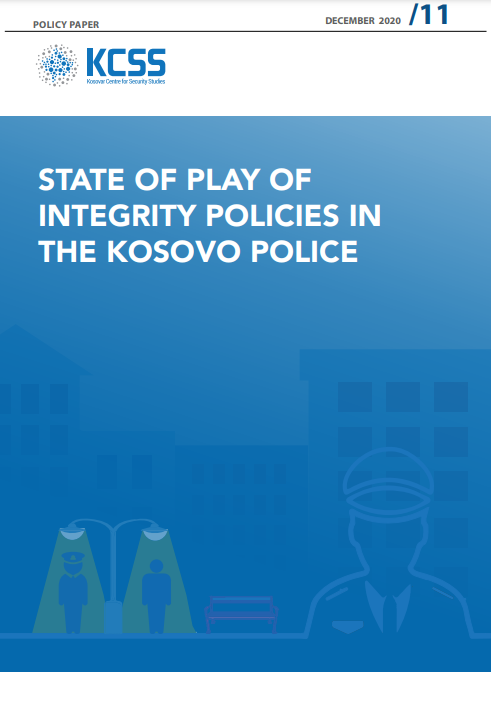11/12/2020

Kosovar Center for Security Studies (KCSS)
Kosovo Foundation for Open Society (KFOS)
Plator Avdiu & Shpat Balaj
In recent years, Kosovo’s security sector integrity practices, in particular Kosovo Police ones, have run into severe challenges, which have been exacerbated by the current Covid-19 pandemic the country is dealing with. Numerous police officers are subjected to criminal investigations by relevant rule-of-law mechanisms (Police Inspectorate of Kosovo and State Prosecution) for alleged criminal offenses related to breaches of legal procedures governing their official duties. On the other hand, the Prime Minister’s decision of October 2020 to discharge the former General Director of the Kosovo Police, has both directly and indirectly paved the way for political influence over the Kosovo Police by ruling parties. Furthermore, this may have a significant impact on discouraging structural reforms in the police, particularly in human resource management.
This paper provides an overview of the current legislation, legal instruments and legal procedures in place for preventing and fighting corruption and conflict of interest, and an analysis aimed at identifying gaps and deficiencies in the current legal framework in this regard. The failure of Kosovo institutions to upgrade anti-corruption legislation on asset declarations and to adopt secondary legislation on whistleblowing, indicates that there is a lack of robust commitment and political will to strengthen the integrity of state institutions, including the Kosovo Police. In this section on the legal framework, the report analyses the legislation on integrity and anti-corruption issues specifically related to the Kosovo Police. The Law on Police and specific secondary legislation of the Kosovo Police define the integrity principles and standardised procedure of the Kosovo Police. The process of drafting a specific Regulation on Integrity in the Kosovo Police has been initiated, but to date (December 2020) no information is available whether the Regulation has been adopted by the relevant institutions.
Given the state of play of integrity practices in the Kosovo Police, this paper provides a number of specific recommendations for the Kosovo Police on strengthening integrity, aiming at the professional development of the institution and enhancement of anti-corruption measures.
•The Kosovo institutions (Government and the Assembly) should at the earliest time adopt the new legislation on asset declaration and secondary legislation on whistleblowing which would further contribute to prevention of corruption in the public institutions, including the Kosovo Police. In this regard, if not adopted yet, the police should also adopt the Regulation on Integrity and align it with the current legal framework in the field of anti-corruption.
•Central Institutions and the Kosovo Assembly should ensure that the law on early retirement and law on invalidity treatment for KP officers is established in order to increase the efficiency of the Kosovo Police and allow room for human resource reform within the institution;
•The police should include external oversight mechanisms and institutions in drafting the new Integrity Plan, so they can ensure a more comprehensive approach that would contribute to a more detailed analysis of at-risk areas and compilation of concrete activities in strengthening the integrity in the institution, based on the actual capacities;
•Considering the dismissal of the General Director of the Kosovo Police and the argument that his dismissal derives as a result of the unlawful change of the police Organogram by then General Director, the Ministry of Internal Affairs and the Kosovo Police should provide concrete and clear information on how is the police organizational structure organized;
•Kosovo Police should ensure that the distribution of human resources is conducted based on the Authorized Personnel List, while the latter is prepared based on the actual needs and capacities of police;
•In order to address the problem of human resource distribution in the Kosovo Police departments, internal procedures should be reviewed and the effectiveness of ranking and promotion processes should be increased. The reports of the external oversight mechanisms such as Police Inspectorate of Kosovo and National Audit Office should be based on the dynamics of the institution and the actual possibilities for the distribution of human resources, based on the internal regulations and procedures of the Kosovo Police;
•National Audit Office should ensure that their officials conduct a security clearance by the Kosovo Intelligence Agency, so they can access and audit the classified contracts that consist a large portion of budget execution.
This publication has been produced with the support of the Kosovo Foundation for Open Society (KFOS) in the framework of the project “Strengthening integrity in the Kosovo Police”. The views expressed in this publication are the sole responsibility of the Kosovar Centre for Security Studies and do not necessarily represent those of the KFOS.